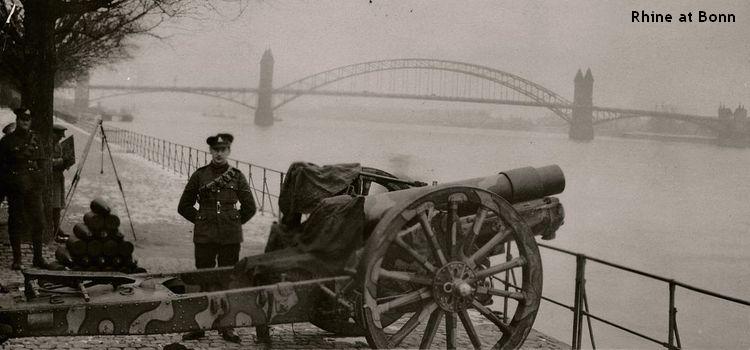
[Rhineland, autumn 1919] By the end of September, fraternization was finally allowed, and both Germans and American soldiers seemed pleased. Chiara made plans to meet her German relatives.
On the way to Bonn
Some weeks later Chiara and John rode on a train from Coblenz to Bonn, they had arranged to meet their German relatives there. As the Rhine scenery passed by, Chiara’s thoughts started to run. The only Bergmanns she knew were Lottie and Matthias, and that was now almost 25 years ago, and there was a war between back then and now. Chiara recognized the region she had seen on postcards, but not the people. Were these the open-minded, merry Rhinelanders, like her beloved grandfather had been? Some people looked at her openly, gave her a shy smile, other faces remained reserved.
Wars do not end in peace
The Versailles Peace Treaty was hard on Germany, and it was hard to be occupied. Many feared sanctions and arbitrary acts from the French. She could understand that, and at the same time she felt with the French whose country had so terribly suffered from the war and German occupation. She shared her thoughts with her husband John. “We are here because we want peace at this frontier as soon as possible. Reconstruction, trade, and economy should soon get going,” John said.
Chiara nodded. “Yes, just wars do not end in peace. How can we have real peace as long as the Germans do not acknowledge, maybe not even want to see what they did to France and Belgium? France in turn has to understand that Germany sinking into chaos won’t help anyone. Yet, it is most important to them to weaken Germany. General Mangin in Mainz openly supports Rhenish separatists and defends the policy of detaching the Rhine Province from Prussia that it may serve as a buffer state.
Look at Germany, it is almost civil war like. The National Assembly is meeting in Weimar, but the radical Left hates it, and the radical Right can’t wait for the day when they can overthrow the republic. This Ludendorff keeps claiming that the German army was “undefeated in the field” and had been “stabbed in the back”, so he has told a British officer. How can we trust the German military’s openness for peace? It is crucial that a constitutional government in Germany prevails.”
A compromise that left no one content
She also wondered how they, US-Americans, would be received. During the Versailles Peace Conference, the Germans – many surely in all honesty, others in cynical speculation – hat put their hopes on President Wilson and his “peace without victory”. But in Paris massive interests stood against Wilson’s idea. The French Prime Minister Clemenceau urged to punish Germany. Wilson himself saw little reason for clemency – the cheers of many Germans over the peace dictate of Brest-Litowsk imposed on Russia biased him against Germany.
To win over Lloyd George and Clemenceau for his vision of a League of Nations, he made far-reaching concessions, so the treaty was a compromise that left no one content: the Germans considered it a “dictate” forced upon them, for the French it was way too lenient on Germany.
Family meeting in Bonn
But when Chiara and John arrived in Bonn and got of the train, with anxious feelings, all doubts vanished. A group of people stood on the platform, waiting for the train from Coblenz. She recognized Lottie and Matthias and Susan, although aged. Next to them stood three young people, two of whom looked like Lottie and Matthias at a young age. Lottie walked towards her, hesitantly, then faster. Then she stood in front of her, with tears in her eyes, and gave her a hug. “I’m so glad that this horrible war is finally over,” she said again and again.

Be the first to comment